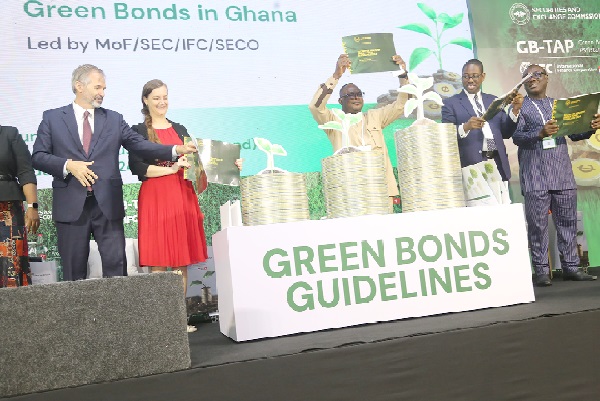
Govt develops new framework for green bonds issuance
The framework which is aimed at promoting sustainable finance will ensure that proceeds from such bonds are exclusively used to finance and/or refinance green, social and sustainable projects.
Within the Framework is the Sustainability-Linked Finance Framework to further support the country’s journey towards achieving the Sustainable Development Goals (SDGs) and Africa’s Agenda 2063.
Director of the Financial Sector Division of the Ministry of Finance, Sampson Akligoh, said this in a keynote address read on his behalf at the launch of the Green Bonds Guidelines by the Securities and Exchange Commission (SEC).
He said the framework would manifest the country’s commitment towards deploying its National Budget to achieve measurable environmental and social outcomes in priority areas or policies.
“This demonstrates how the government will periodically screen the strategies developed by the various Ministries, Departments and Agencies (MDAs) for programmes and projects with green and/or social credentials that will be funded from the National Budget.
“These programmes and projects will form the basis for issuances of Green, Social or Sustainability Financing to fund new or existing projects that have been identified,” he said.
As part of their continued commitment to high-quality public sector green bond issuances, he said the government would be updating the framework to align with the evolving global taxonomy for green activities with all key stakeholders.
Mr Akligoh said the government was also promoting the establishment of an International Financial Services Centre (IFSC) to position the country as a strategic hub for international/regional finance.
Recognising that carbon market mechanisms such as green bonds, carbon stock exchanges and green banks are increasing rapidly across the world, he said the IFSC initiative would develop carbon debt markets and green finance markets to serve the West Africa region.
International best practice
The Director General of the Securities and Exchange Commission, Daniel Ogbarmey Tetteh, said the Green Bonds Guidelines that was designed in collaboration with the International Finance Corporation (IFC) of the World Bank align with international best practices and provide a robust framework for the issuance and management of green bonds in the country.
He said they are designed to foster transparency, ensure credibility and mitigate risks, thereby instilling confidence in investors and issuers alike and also aim to promote the standardisation of green bonds reporting, a critical step in ensuring transparency and attracting both domestic and international investors.
Mr Ogbarmey Tetteh said the green bonds enabled by these guidelines would channel much-needed capital into areas of the Ghanaian economy such as green infrastructure, water and waste management, affordable green housing and centralised and distributed renewable energy/power generation stations, among others.
He said this would enable the country to advance in its quest to combat climate change, conserve its natural resources and promote a circular economy.
“This can empower businesses to embrace sustainable practices, create green jobs and drive innovation in clean technologies.
“By supporting these efforts, green bonds can contribute to building a more resilient economy prepared to weather the challenges of a changing climate,” he said.
The Director General noted that the successful implementation of these guidelines hinges on the collective efforts and commitment of all industry practitioners.
“The SEC is dedicated to fostering a market environment that is fair, transparent and conducive to growth,” he said.
Climate-related issues
Senior Country Manager of IFC, Kyle Kelhofer, for his part, said the corporation has in the last decade invested over $2.5 billion into the Ghanaian economy through sectors such as banking, infrastructure, manufacturing, agribusiness and education/healthcare services.
He said in 2023, the IFC, as part of its counter-cyclical mandate, provided over $400 million in investments, delivering its largest programme in the past 10 years.
“And as we step up these investments in Ghana, as well as globally, we are increasingly cognizant of the importance of climate change as a defining development issue of our time.
“The need to focus on climate change-related issues is further underscored in the World Bank Group’s Ghana's Country Climate Development Report, which outlines the critical role of the private sector in climate resilience and advocates for a supportive investment environment and green finance strategies to boost private sector contributions to low-carbon development,” he said.
Mr Kelhofer said IFC has, since 2010, been a leader in shaping the Green Bond market by setting guidelines, offering technical help to regulators and issuers and being an active issuer and investor.
He said the guidelines aim to promote the role of the financial market in the financing of projects that meet the environmental development needs of Ghana.
“In other words, these guidelines are intended to support the establishment of a domestic market for green securities, ensure their credibility through transparency and integrity and prevent the issuance and investment in bonds that are falsely marketed as "green," he said.